A week ago, a mob of local people in Chios harassed refugees that were occupying the town’s port, threatened and employed violence against solidarity groups helping them and demanded the refugees go to camps in town. In the aftermath, multiple statements have appeared about what happened, some at variance with each other (and reality).
The mob didn’t appear out of the blue. Frustrations had mounted for weeks, and due to the absolute lack of democracy and dignity that suffocates Greece these years, they weren’t addressed – and still haven’t been resolved. This story has deep roots, but it seems to me the key event happened on Sunday, April 3, on the eve of the first mass-deportations to Turkey. But let’s set the scene.
No migrant no cry
For months, refugees in Greece had been kept in open camps on the islands. The EU-Turkey deal, signed on March 18, forced the Greek government to clear the islands and to detain all incoming refugees on arrival. Its capacity to do this in one day and then to provide for the prisoners, to process their asylum claims and deport those who didn’t satisfy the asylum criteria was always a fantasy. Following a year-long tradition, the Greek government still tried, because Europe ordered it to. The catastrophe that resulted has been documented in previous blogs. What I haven’t documented is the local reaction.
Two things were bound to antagonize Greek locals, especially on the islands. Firstly, the fact that police and coast guard boats, cars and staff now swarmed the streets and ports as never before. Greece has been symbolically, financially and politically cleansed of democracy. Now the islands’ key enforcement and protective institutions were being declared insufficient and then taken over by a pan-European coalition. I haven’t asked the nationalists here how this makes them feel, but it doesn’t take much imagination to predict their frustration.
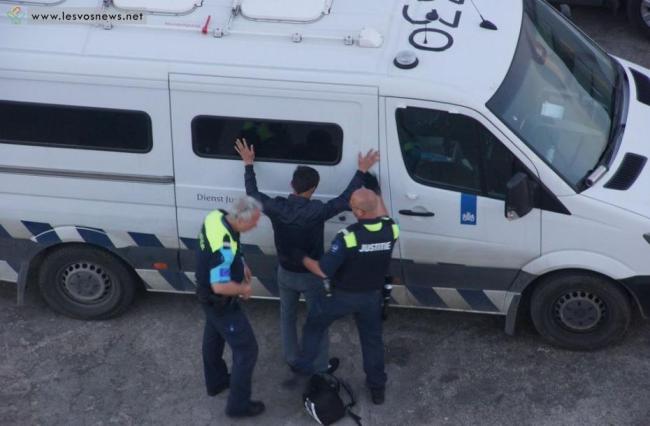
The second antagonizing factor to locals was that, now that refugees were being imprisoned and their hopes and dreams ground to dust, they were much more prone to fighting. Overcrowded prisons, lack of food, facilities and hygiene products, very weak guarding and prisoners with nothing to lose could only end badly. People living close to the prison didn’t want this in their backyard. It didn’t help that the prison was “leaky,” there were holes in the fences. Prisoners sometimes got out and walked through farmers’ fields to get SIM cards and other necessities from town. Police tolerated it, because by and large the refugees returned. But for a farmer, having a “prisoner” pop up in your olive grove wasn’t welcome.
It was the talk of town that this was Bad News, all of it, and that it wasn’t being worked on. The local government wasn’t the one calling the shots, the Greek government was only running these camps under pressure from Brussels. The relevant decisions were being made half a continent away. What chance did the locals have? None, it seemed, except direct action.
Prison break
Inside Vial, refugees were developing the same idea. On March 31, Chios locals, solidarity groups and volunteers protested the detention of refugees. Refugees inside joined in chanting, and then broke out.
After the protest, most of them went inside again. But the police’s hand was tipped. They seemed incapable of keeping the refugees locked up against their will. The next day, hundreds of refugees broke out for good. They went to the port of Chios town and occupied it. They wanted to go to Athens. When I asked them what they’d do when the ferry came, in case they were forbidden to go on it, some said they would try by force. The prison break had heightened their spirits. Most refugees, though, seemed hopeful that they would simply be allowed on. But the ferry was redirected to another port, dashing any such plans, and greatly disturbing the Liliputian economy of Chios.
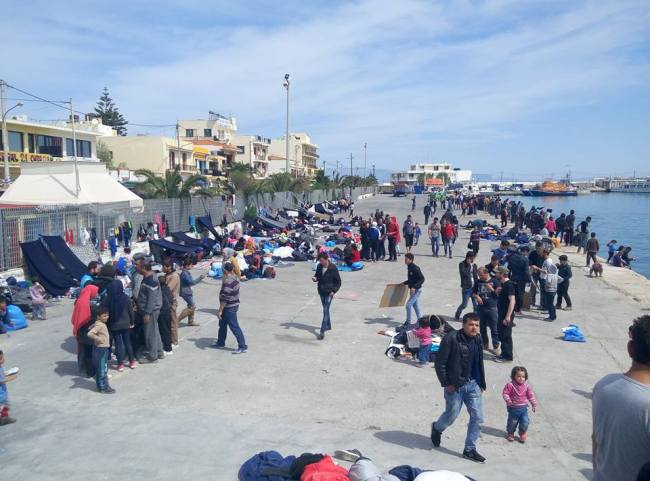
Yet the refugees remained at the port, for many reasons. Although the local authorities immediately offered them an open camp to stay in (three cheers for direct action!), most didn’t go. They were suspicious of camps. They wanted to go, not stay. They didn’t want to be hidden out of sight, no matter how much more comfortable it might be than sleeping on the concrete floor of the port. It was simply and clearly a political choice. Media was following the action, the refugees could talk openly with anyone they chose. They had freedom and the ear of the public.
Not In My Back Yard
In the afternoon of Sunday, April 3, dozens of refugees were separated from those remaining in Vial. They were to be driven to Tabakika, a migrant processing factory in Chios town. They were to be deported to Turkey the next day, the first installment of the mass-deportations agreed on with Turkey. But neighbors of the huge and ghostly warehouse, apprehensive after the previous weeks’ stories, tried to stop people being transported there.
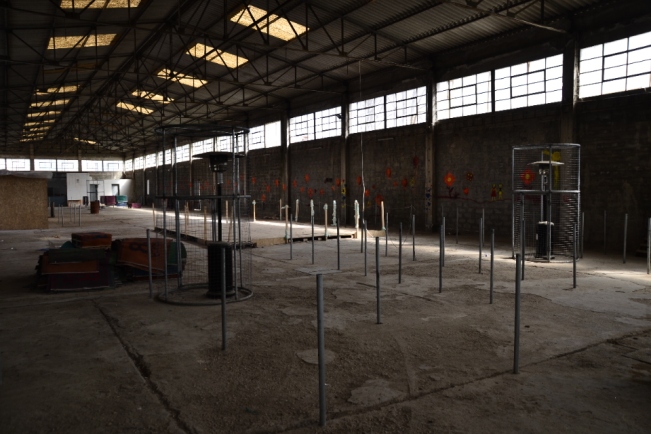
The tranquil Greek islands have no native riot police. Their officers do have some shin pads and helmets, but no units of the dreaded green-clad MAT. With the mass-imprisonment scheme, however, MAT-buses had been shipped to the islands. And now they were made to clear the way for the refugee transport. The result was ugly.
You can see the shock and dismay of the protesters. One of them (2’10”) shouts at the MAT: “You came here to beat them, the criminals, and you beat us [instead]!” Also: “Are you Greeks?! Dogs! Get out of here!”
Deportations, port reopens
The next morning, Monday, April 4, the refugees from Tabakika were deported without a hitch. On Tuesday evening, the port was split up into two parts: occupation and shipping. Refugees were allowed to stay on a third of the area, business could then go on as usual on the remainder. A fence was drilled into the concrete.
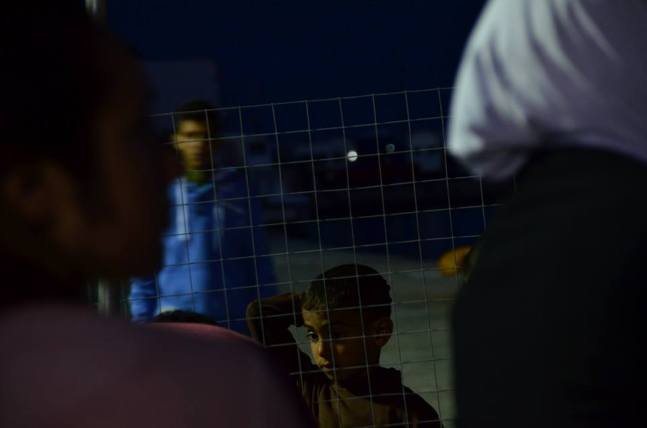
This meant that the port could now be used – maybe not as comfortably as before, but still without incident. An Athens-ferry came and went, the ferry that the refugees wanted more than anything to leave with, and they simply watched it peacefully.
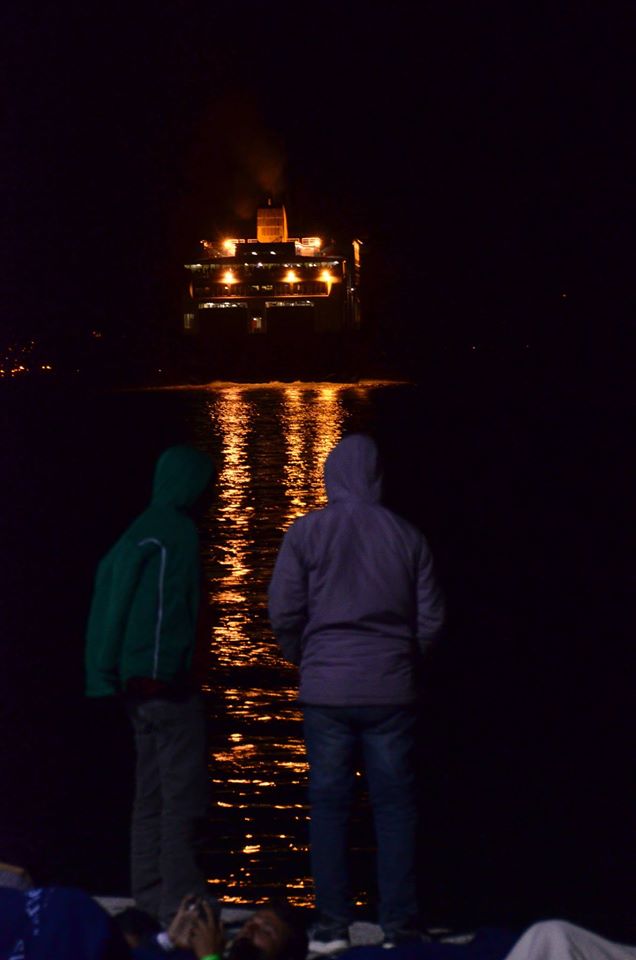
Municipal meeting and protests
The next day, Wednesday, April 6, when the Chios municipal council was to be in session, a protest was called outside the municipal building – on the town square. The call proclaimed in red letters, printed on top of photos of the port occupation and the MAT-incident: “Men and women of Chios – That’s enough!!”
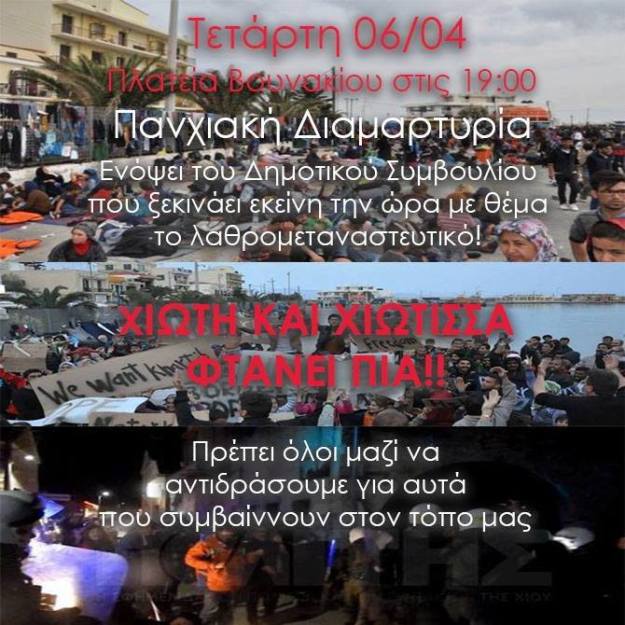
It referred to the refugees with the xenophobic term λαφρομετανάστες, “smuggled migrants”. While the call was anonymous, it seems to have been made with some effort, since a printed banner was used at the protest. In a move bordering on the embarrassing, it read that Chios residents would soon become refugees themselves. Another one said: “WE ARE NOT RACISTS!” (The banner doth protest to much, methinks.)
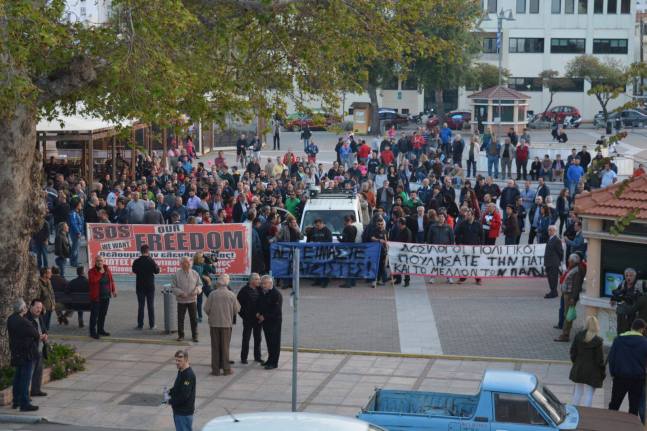
As for the attitudes and motives behind the call, it’s slightly murky. Possibly a far-right group had finally found a topic to play on. The attitudes it stirred up were certainly along those lines, if Facebook discussions are anything to go by. On the square, the national anthem was sung. Activists showed up with a pro-refugee banner that was ripped to pieces. Media was shoved away. The municipal meeting was stormed and disrupted. Volunteers were harassed.
Here’s them singing the anthem:
After some very agitated hours, the meeting adjourned, having skirted the main topics of the protesters. (The council decided to demand of the Greek government that Vial be opened.) The protesters had themselves vanished and promised to take things into their own hands two days later, Thursday, April 7. Later in the night, however, a bomb was thrown at Soli Cafe, an occupied house where refugees can eat, get clothes and get support. The mood of the town was souring quickly.
The port gets mobbed
On Thursday afternoon, refugees in the port were having one of their lively protests. As they did, one of the refugees climbed up to the Greek and EU flags flying above the port. This had happened many times before, and was almost routine: he kissed them, honored them, waved and posed for photos.
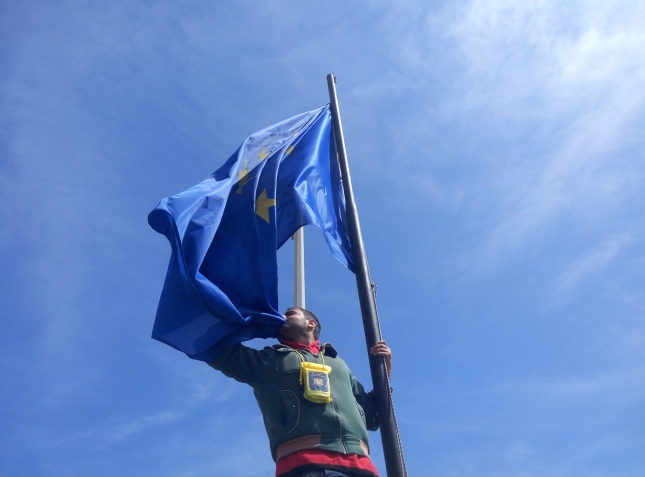
Later it would be claimed that he was about to rip the Greek flag down, but this was contradicted by the accounts of numerous refugees and journalists. It also goes against the whole mood and attitude of the refugees, who had made a banner saying “Thank you Greece” and who had not been at all confrontational, except in the initial move to occupy the port. An attack on the flag, however, was said to have been the provocation. The refugee was attacked, but ran away. “Concerned citizens” heaped around and shouted at solidarity groups to leave the port. The mood was electric. Suddenly a plainly clothed trio marched towards us (I was standing inside the port at the time) and ordered us to go out. I asked for identification, and though they didn’t give it, they said they were from the port police. They seemed very hurried. I walked out and saw the mob approach the gate where we were walking out. I walked away, but when I looked back, I saw one member of solidarity get swarmed, shoved onto the ground and then beaten up.
The latter part of the video shows the more disturbing part of the evening. It took place some hours later. Refugees had been herded into an easily defended (but also pretty much fenced-off) part of the port when solidarity was cloeared out. Media was allowed in, but the MAT arrayed itself between refugees and the mob.
The shields were turned towards the mob, so it was obvious where the physical threat lay. Nonetheless, uniformed officers – locals – stood in the mob, chatting merrily with the “concerned citizens”. When a firecracker was thrown into the refugee throng, nobody got arrested. The mob wasn’t made to move away. On the contrary, as can be seen in the video, the man in the suit – the mayor – used the occasion to threaten the refugees that if they didn’t come with him, they’d fare the worse for it. “You come with me or you go with them!” he shouts. Numerous refugees were arrested that night, charged on five counts and, two days later, convicted.
Much has been made of the fact that the mob didn’t attack most refugees it came into contact with. (The union of Coast Guard officials especially touted this fact in a rather hysterical press release.) That would also have been outrageously brutal, since most of them were families. The fact that this didn’t become a modern day pogrom is not a humanitarian victory. Some refugees were actually attacked, but the lack of physical violence against the rest conceals the tremendous psychological damage the mob inflicted on the port occupants. It is hard to watch the video above and think that this was anything but an attack on them.
As for the solidarity people, who actually were attacked and chased away from the refugees: they were clearly the enemy of the mob. When they tried helping refugee families move away, they were screamed at, told to shut up, threatened with violence. Police confirmed to at least one volunteer in a neutral tone that he would get beaten up if he didn’t go. Police, while not violent against volunteers, condoned the violence inflicted on them. The man whom I saw swarmed and beaten up was arrested immediately and charged with disobeying police orders. He was kept in a police station in handcuffs overnight. In a nearby room, the arrested refugees were being beaten up – for fifteen minutes, one of them says.
String puppets
It is hard to escape the conclusion that the Chios authorities used the mob to cow the refugees into submission. Evacuating the port by force was always out of the question, because of the heavy media presence. But the reaction of the authorities to the mob’s arrival, and the line they took as the night went on, shows how they used the opportunity. Even given the stated will of the authorities, that they didn’t want to protect the occupation, allowing one-sided violence against the occupation and then taking part in it is an effective statement of allegiance: with a xenophobe mob, against refugees making a political statement.
European police have gone to ludicrous lenghts to prove that refugees never do anything of their own accord; that it’s always white activists pulling strings behind the scenes. This smells of racism, and it has ridiculous consequences. Distributing info-leaflets to refugees is now seen as subversive. Having sheets of paper in Arabic stamps you as a possible fomenter of insurrection. Volunteers and activists are constantly being accused of taking money for their humanitarian work. (This isn’t specific to the refugee crisis. Environmental activists have heard this many times before, normally from people who don’t understand why you would lift a finger for anyone except if you got money for it.) The suspicion sometimes becomes laughable, for instance when an activist in Chios was charged with espionage for taking a photo of a Frontex-boat.
Yet activists don’t really benefit from any of this. They are just working for a better world. And this puts the authorities of Chios in a strange light. They got rid of a political problem, benefiting politically, by explicitly threatening refugees with a mob. The port was operational, so the practical reasons for evacuating it were slim. It was cynical opportunism, one that gives a loud and clear message to residents of Chios: if you have problems with a minority, forming a mob and threatening physical violence may be your best bet.

![IMG-20160401-WA0006[1]](https://refugeetrail.files.wordpress.com/2016/04/img-20160401-wa00061.jpg?w=600&h=338)
![P60401-161248[1].jpg](https://refugeetrail.files.wordpress.com/2016/04/p60401-1612481.jpg?w=600&h=445)
![P60331-172250[1].jpg](https://refugeetrail.files.wordpress.com/2016/04/p60331-1722501.jpg?w=600)
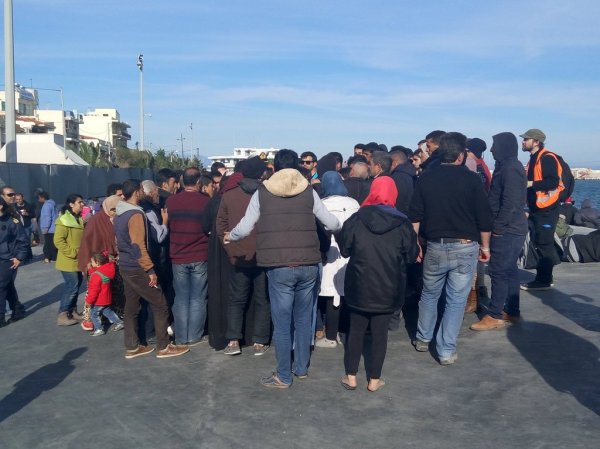
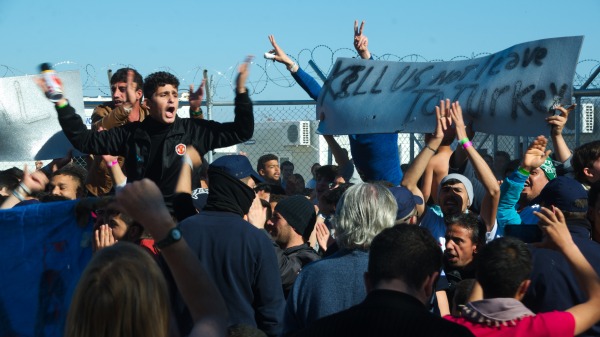
![P60331-175837[1].jpg](https://refugeetrail.files.wordpress.com/2016/04/p60331-1758371.jpg?w=600)